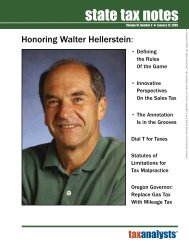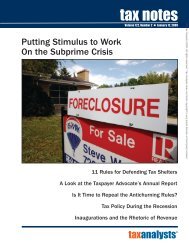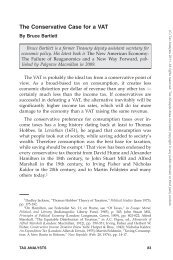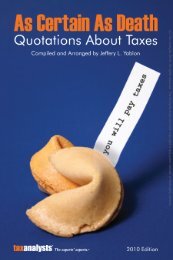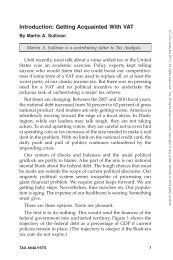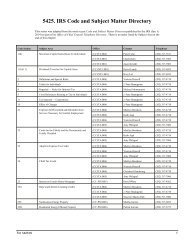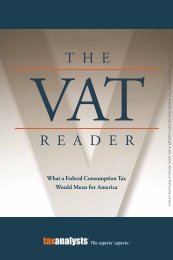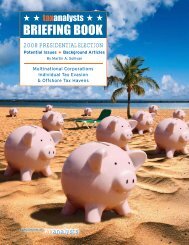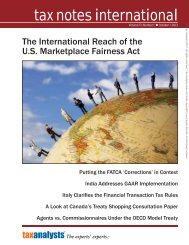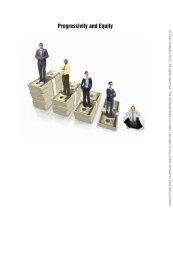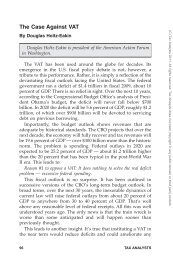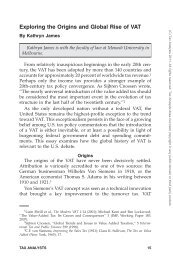Forty Years of Change, One Constant: Tax Analysts
Forty Years of Change, One Constant: Tax Analysts
Forty Years of Change, One Constant: Tax Analysts
Create successful ePaper yourself
Turn your PDF publications into a flip-book with our unique Google optimized e-Paper software.
<strong>Forty</strong> <strong>Years</strong> <strong>of</strong> <strong>Change</strong>, <strong>One</strong> <strong>Constant</strong>: <strong>Tax</strong> <strong>Analysts</strong><br />
separately, or head <strong>of</strong> household? Does anyone<br />
who prepares a return by computer know the<br />
answer? Probably not. Similar headaches for<br />
calculating depreciation, accumulated depreciation,<br />
and depreciation recapture are just a few<br />
keystrokes away when using tax s<strong>of</strong>tware. Without<br />
it, no one could quickly or accurately prepare a<br />
Schedule C or the related self-employment tax<br />
calculations that accompany the form.<br />
Not only do the tax rates change for inflation,<br />
but so do the standard deduction and personal<br />
exemption amounts. Similarly, does anyone know<br />
if the 2009 exclusion <strong>of</strong> unemployment benefits<br />
still applies in 2010? No problem; just input the<br />
unemployment income and the tax s<strong>of</strong>tware will<br />
figure it out.<br />
<strong>Forty</strong> years ago there were few tax credits and<br />
none for college or retirement. There were also<br />
no above-the-line deductions for health savings<br />
accounts or for self-employed health insurance<br />
payments. This isn’t a question <strong>of</strong> fairness but <strong>of</strong><br />
complexity. Not only has Congress added numerous<br />
credits and deductions, but many <strong>of</strong> them phase<br />
out at different adjusted gross income limits.<br />
What allows Congress to require all these calculations<br />
while not substantially complicating the tax<br />
preparation process, and thus not hearing complaints<br />
from the tax preparation community? <strong>Tax</strong><br />
preparation s<strong>of</strong>tware. When faced with the phaseouts<br />
and phase-ins, just put everything into the<br />
computer, and like magic the s<strong>of</strong>tware produces a<br />
complete and properly calculated tax return. This<br />
is especially true with the alternative minimum<br />
tax calculations. Anyone want to try the AMT<br />
by hand, especially if there are depreciation and<br />
passive activity losses?<br />
For those who would argue that it’s not that<br />
hard to calculate these things, they may be correct<br />
— until the tax rules change. With computers,<br />
that’s no big deal. Making the last-minute changes<br />
can be done in microseconds; by hand they could<br />
take hours. Does anyone know how to calculate<br />
the long-term capital gains for low-income taxpayers?<br />
The IRS worksheet contains 35 lines for<br />
calculating the applicable capital gains rates. How<br />
long would that take to calculate manually?<br />
Of course, the problem with tax preparation<br />
s<strong>of</strong>tware being accurate is that garbage in creates<br />
garbage out. For the computer to properly calculate<br />
the different capital gains rates, one has to<br />
know what is a collectible. The meaning and<br />
application <strong>of</strong> collectibles, like many other definitions,<br />
have not been made palatable by computer<br />
s<strong>of</strong>tware programs. The s<strong>of</strong>tware makes calculations<br />
palatable only once the preparer has properly<br />
identified the classification. Preparers still have to<br />
figure out which rate or rule applies.<br />
Unlike 40 years ago, it no longer seems realistic<br />
to prepare a tax return by hand, including Form<br />
1040EZ. That’s especially true if you live in a state<br />
that also requires tax returns. The complications<br />
involved in the numerous calculations, especially<br />
those adjustments required to calculate the AMT,<br />
have made year-end tax planning a new sport with<br />
a short season. The same is true <strong>of</strong> payroll tax<br />
preparation.<br />
If not for tax s<strong>of</strong>tware, where would return preparers<br />
be? Maybe better <strong>of</strong>f, as Congress might not<br />
have added so many changes over the last 40 years.<br />
Michael J. Murphy<br />
Sutherland Asbill & Brennan LLP<br />
Washington<br />
My career at the IRS went from 1962 to 1992,<br />
followed by 10 years with the <strong>Tax</strong> Executives<br />
Institute and now with Sutherland Asbill & Brennan<br />
LLP. It’s been a great time to be involved in tax administration<br />
in this country. Here are my candidates<br />
for the most significant event over the last 40 years:<br />
• Early 1970s: President Nixon directs the IRS<br />
to administer the Economic Stabilization Program<br />
(wage/price controls). Don Alexander<br />
was commissioner.<br />
• 1980: President Reagan’s tax reforms placed<br />
heavy burdens on the IRS and Treasury.<br />
The department and the IRS came through<br />
with flying colors. Roscoe Egger and Larry<br />
Gibbs were commissioners. Ken Gideon,<br />
Fred Goldberg, and Will Nelson were chief<br />
counsels during this challenging time.<br />
• Late 1980s - Early 1990s: The IRS became<br />
strongly committed to electronic filing. Larry<br />
Gibbs and Fred Goldberg were commissioners.<br />
• Late 1990s: The 1998 Restructuring Act was<br />
a major change for the IRS and taxpayers.<br />
The IRS moved from being highly decentralized,<br />
with regional and district <strong>of</strong>fices, to being<br />
more centralized with line and functional<br />
management taking place in five major divisions<br />
headquartered in Washington. Charles<br />
Rossotti was the commissioner responsible<br />
for the implementation <strong>of</strong> the restructuring.<br />
Margaret Richardson and Fred Goldberg were<br />
members <strong>of</strong> the restructuring committee.<br />
17



